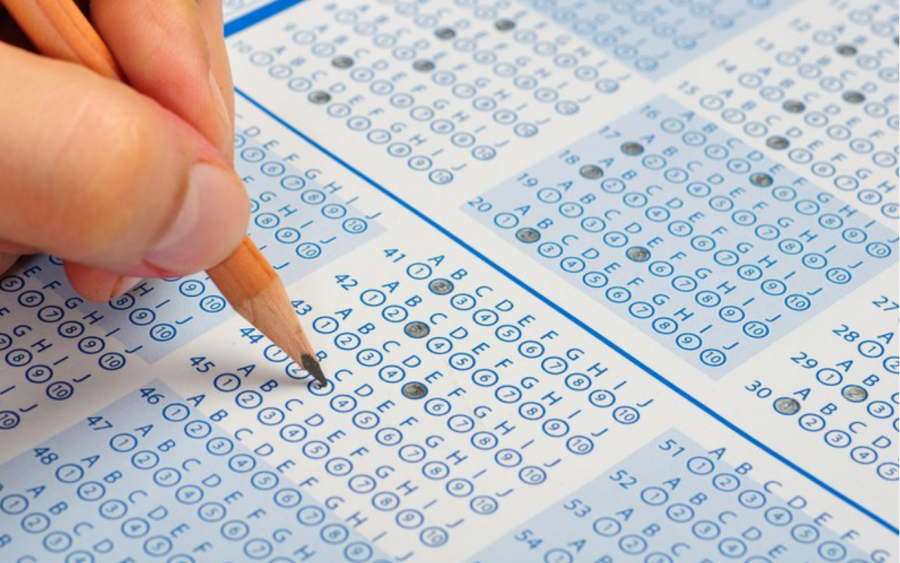The College Board announced Jan. 19 that they would eliminate two major components of the SAT: the SAT subject tests and the optional essay on the standard SAT, stating the coronavirus has accelerated the drive to “reduce and simplify demands on students.”
For years, the optional essay and subject tests were supposed to help gauge students’ analytical skills and mastery of specific studies. These exams served a fundamental role in college admissions as a way for students to accumulate extra credentials to their applications. Ivy League schools, as well as other prestigious colleges, often recommended and encouraged subject test scores in addition to the standard SAT or ACT.
The emerging coronavirus crisis has “accelerated a process already underway at the College Board to reduce and simplify demands on students,” the College Board’s website says. The College Board hopes that students will show their academic aptitude in other ways, either through extracurricular activities or AP exams.
The pandemic, which closed schools in March 2020 and continues to disrupt education of all levels, has created trouble for the SAT as well. In 2020, only 900,000 of the 2.2 million test registrations were fulfilled after numerous test centers closed for public health reasons, according to the Washington Post.
Many colleges and universities have ended, or at least temporarily suspended, testing requirements. Some colleges have concluded that standardized test scores are no longer necessary to choose from prospective students. Others have made temporary accommodations, like forgoing test scores for the single school year, to account for uneven access to testing. With each college taking a different approach to the impacts of the pandemic, the College Board officially ended the need for confusion.
Thyra L. Briggs, Vice President of Admission and Financial Aid at Harvey Mudd College, supported the College Board’s announcement.
“Prior to the start of the pandemic last year, Harvey Mudd had announced that we would no longer consider SAT Subject Test scores, so the fact that the College Board has discontinued them won’t affect our process,” Briggs said in an email. “We never saw any value in the SAT essay section and never used it, so that change will not impact our process either.”
Briggs hopes that the shift would be a cue to prospective students that what matters most is their high school record and other aspects of their application. “It has always seemed to me that the amount of time students spend on test prep could be better focused in other areas,” Briggs wrote. “Hopefully the recent changes announced by the College Board will encourage students to focus their energy in other ultimately more rewarding areas.”
But, research shows the potential for both positive and negative implications upon prospective students.
On one hand, it allows students to pursue classes they are genuinely interested in and distinguish themselves in ways beyond a test score. Students now have more time to focus on school work, engage in self-care, and take classes that help them secure college credit.
The elimination of the SAT essay and subject tests also helps those from low-income families. The SAT subject tests, in particular, have a history of being discriminatory towards underprivileged groups. This is because many families do not have the finances to take or prepare for these exams, according to Forbes. A complete elimination of these components would diminish these financial barriers, resulting in a more fair playing ground.
According to Ibrahm X. Kendi’s book “Stamped from the Beginning,” the SAT and ACT come from a history of racism, stemming from literacy tests presented to disenfranchised Americans. As a result, marginalized communities still tend to fare the worst on these exams.
Likewise, this also helps students who struggle with test anxiety, a state of extreme distress in testing situations. About 16 to 20 percent of students experience high test anxiety, and another 18 percent are troubled by moderately-high test anxiety, according to the American Test Anxieties Association. Testing anxiety leaves millions of students not being able to show their full potential through standardized exams. The recent reforms would give college admission teams a more complete depiction of an individual student.
However, the elimination of the SAT essay and subject tests could also present limitations on those from marginalized groups who may have less access to extracurricular activities. Now that standardized test scores are out of the picture, college admission teams will have to depend on extracurriculars and other exams to judge a prospective student. But not all students have access to the money, time or resources that are necessary to start and succeed in an extracurricular activity.
Not only that, the elimination of the SAT essay and subject tests could pressure students to show their academic aptitude through AP exams. The problem is that different students have varying access to AP classes. Nearly 2,000 schools across the U.S. have little to no AP course options, according to the New York Times. Uneven access to AP classes puts these students fundamentally behind in the eyes of admission directors, creating an unfair admissions pool.
“I was pretty surprised by the announcement,” Sarah Brown ‘24 said. “For decades, these tests have been used to compare students from different schools and backgrounds. This year, though, some of the most prestigious colleges chose to go test-optional and saw a significant increase in admission rates. Hopefully, a complete elimination of the SAT essay and subject tests will encourage more students to apply.”
Other students feel similarly, pointing out that the SAT subject tests can be substituted by other means, such as AP exams.
“Most people will be taking the AP exams at the upper school, so perhaps the SAT subject tests were somewhat repetitive,” Grant Park ‘24 said. “Personally, I think that the AP exam will be more important. I believe that phasing out standardized testing will eliminate some of the disadvantages that exist for underprivileged students.”






